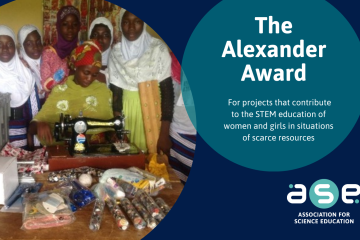The ASE Alexander Award

Applications for Alexander Award
The Alexander Award, established in 2001 by Mary Alexander Harris, honours three members of the Alexander family, Sir Norman, his first wife Elizabeth and second wife Constance, who made major contributions to science education worldwide from 1936 to 1997.
The prize is awarded annually to a woman or group of women who has made a significant contribution to the scientific, technological, engineering or mathematical (STEM) education of girls or women, in situations of scarce resources.
How to Apply
Applications open in September. If you are a woman or group of women teaching science, technology or mathematics, who has made a significant contribution to the scientific, technological or mathematics education of girls or women in situations of scarce resources please do apply.
To apply or submit a nomination please complete the form. Please include details of the project lead, location and details of how the nomination meets the criteria of the award (ie the project or nominee must be contributing to the STEM education of girls and women in situations of scarce resources).
Applications Open in September
Winners will be announced at the ASE Annual Conference
History behind the Award
Sir Norman Alexander was a physicist at University College Ibadan, Nigeria, Vice Chancellor of Ahmadu Bello University, then Vice Chancellor of The University of the South Pacific. He also played a major part in the foundation of the universities of the West Indies, Ghana, Zambia, Mauritius, Botswana, Lesotho and Swaziland. From 1942-1945 he was interned in Singapore.
Sir Norman's wife Elizabeth Alexander, a geologist and physicist working in Naval Intelligence, was evacuated to New Zealand during the war where she established operational research in radar in the South Pacific. In 1947, after she rejoined her husband in Singapore, she became Temporary Registrar for the new University of Malaya, before being commissioned by the government to survey the Island for sources of granite and water for the Island’s post-war reconstruction. In Nigeria, Elizabeth continued with her own research and teaching on tropical soils and established the Department of Geology at Ibadan before her death there in 1958.
Sir Norman subsequently married Professor of Education, Constance Geary who, as chief woman education officer in Northern Nigeria, had made significant advances in the education of Muslim girls. At the time of the 1947 Partition of India, Professor Geary had been Principal of Lahore Women’s College.
On Sir Norman’s death in 1997, a number of his past colleagues and students approached Mary Alexander Harris, one of his daughters who had herself been a chemistry student at Ibadan, to establish a memorial in his honour. Since he would not have been able to achieve so much without the support of Elizabeth and Constance, and since much of Mary's own work in mathematics education was concerned with some of the problems of access to STEM subjects for girls and women, Mary decided that an Award for women teaching STEM subjects to girls or women in situations of scarce resources, would serve the memory and spirit of the Alexanders. The cash award, coming entirely from personal donations, goes directly to the woman or women winners, while giving them public recognition of their work.
Past Winners
Mothers Talking Everyday Science - Sreepur Village, Bangladesh
The Mothers Talking Everyday Science project at Sreepur Village won the Alexander Award in 2024. This project based in Bangladesh, emphasises practical applications of science, rather than rote learning. Mothers engage in activities such as understanding plant growth, fire safety, time-telling, and data collection. Facilitators at Sreepur Village, also integrate science into literacy sessions, covering topics ranging from evaporation to recycling, and practical demonstrations, such as filtering water using a piece of cloth that acts as the filter.
Cynthia Rahinatu Haranuah - Principle of Savelugu Vocational School, Northern Ghana and Pognaa Belaar Marceline Aada I - Principal of Sawla Vocational School, Northern Ghana
Cynthia and Pognaa were awarded the prize for or their outstanding contribution in working to improve lives across Northern Ghana by enabling girls to understand how to use technology, science and numeracy in order to develop a locally marketable skill. Communities in Northern Ghana are doing what they can to improve lives for their children but it can be difficult. Cynthia worked tirelessly to overcome considerable obstacles, demonstrating remarkable determination and resilience. Their girls learn entrepreneurship in addition to the usual courses. Some of their teachers are working for further qualifications. The level of tailoring is extremely high reflecting the strong use of practical mathematics.
